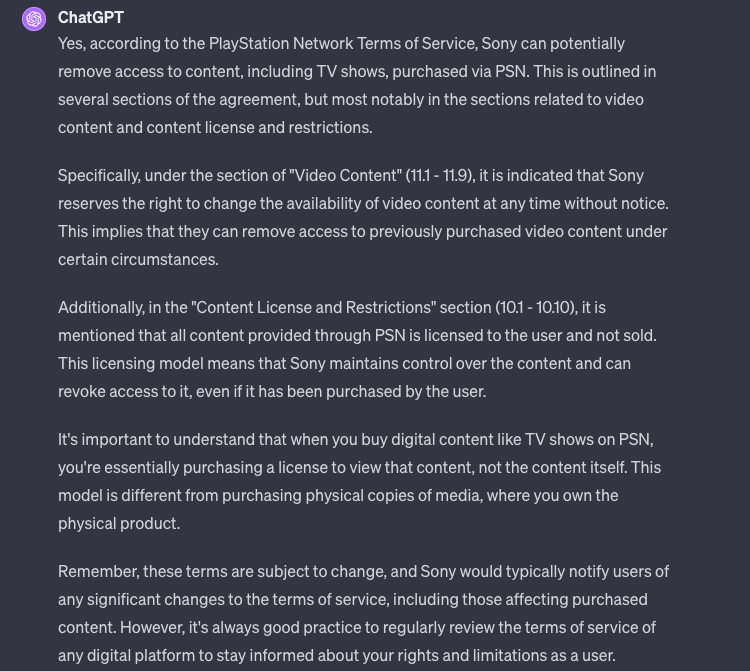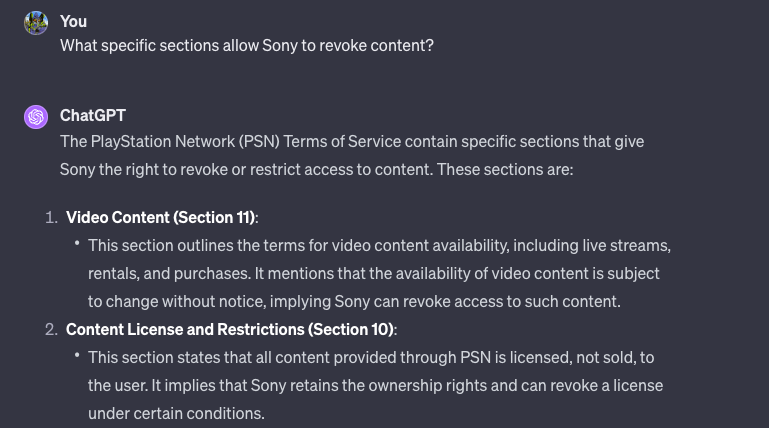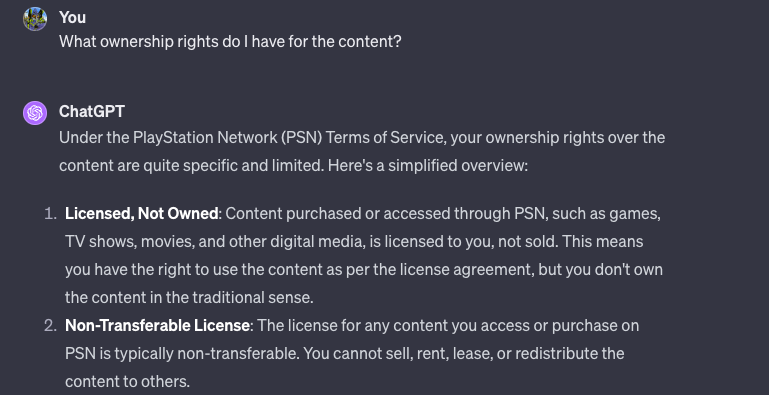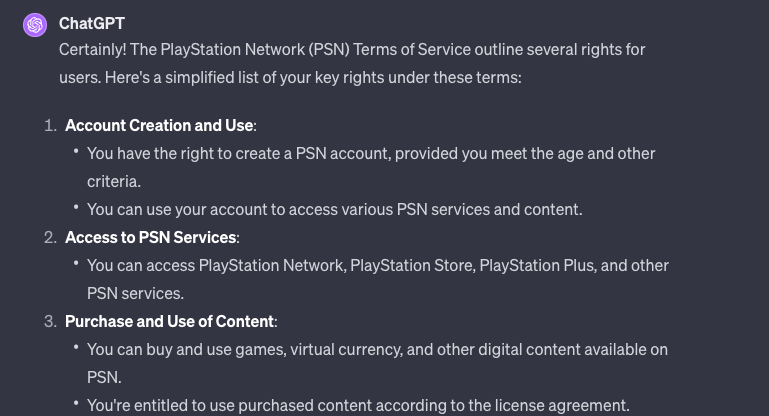
Software, music, films, and other types of content are licensed and not sold. When you pay for these media, you agree to abide by the provisions of that license. Who has the time to read a lengthy agreement for everything they buy? The good news is that ChatGPT can quicly help you understand key facts about an agreement before you click the “accept” button.
ChatGPT is not a replacement for a lawyer, and what it outputs is not legal advice. It can be useful to quickly explore and understand license agreements and to simplify the language, but ultimately only you are responsible for reading and understanding these agreements before agreeing to them.
Why You Should Read a TOS/EULA
A TOS (Terms of Service) or EULA (End-User License Agreement) is an important document that describes your relationship with the rights holder of a piece of media. These documents describe what exactly you get in exchange for the fee, and what the rights and obligations of both parties are. If you don’t read these documents, you can end up unknowingly violating the terms. Also, you can be caught off-guard if the rights holder exercises a right you didn’t know they had. Such as Sony removing TV shows that customers had paid for. This is possible because the PlayStation terms of service states that:
10.1. All intellectual property rights subsisting in PSN Content, including all software, data, services, and other content subsisting in or used in connection with PSN, the Online ID and access to content and hardware used in connection with PSN belong to SIE, its affiliates, and its licensors. Use of the terms “own,” “ownership”, “purchase,” “sale,” “sold,” “sell,” “rent” or “buy” in this Agreement or in connection with PSN Content does not mean or imply any transfer of ownership of any content, data or software or any intellectual property rights from SIE, its affiliates or its licensors to any user or third party.
10.2. Except as stated in this Agreement, all Content provided through PSN is licensed on a non-exclusive and revocable basis to you for your personal, private, non-transferable, non-commercial, limited use on a limited number of PlayStation Devices or other devices in the country in which your Account is registered.
The key term here is “revocable” and that’s exactly what happened with all those shows marked for removal from users’ libraries.
EULAs are often a hot topic of debate, with some claiming they cannot be enforced and others believing they can be enforced no matter what. As with any contract, a TOS or EULA cannot compel or allow you to do something illegal, it cannot take away your legal rights, or ever trump the law of the land. However, if there is no legal conflict with the provisions of the EULA and you have agreed to abide by it, it’s a binding contract.
More importantly, disputes that arise from agreements such as these and how enforceable they are ultimately must be decided by a court of law, which often isn’t practical or affordable to the average user. So, regardless of what you may hear about EULAs, you still need to tread carefully and take the time to understand them.
How to Input a TOS/EULA in ChatGPT
There are various ways to get the text of a EULA into ChatGPT. The simplest, but most tedious way is to copy and paste the text into ChatGPT. Some licenses may be too long to paste in one go, so you may have to paste it in chunks. Then again, if you only have questions about specific sections (such as ownership) then analyzing only those parts may make more sense.
If you’re a ChatGPT Plus subscriber, things are much easier. You can directly upload PDF files to ChatGPT if you’re a paid subscriber, and you can also provide the URL of these agreements if they are online.
Since GPT-4, which is only available to ChatGPT Plus subscribers at the time of writing, is much smarter than GPT 3.5, we’d strongly recommend you use that instead. If you do opt to use the free version for this job, be aware that it’s much more prone to reasoning errors than the newer version.
In this case, I’m going to keep using the PSN Terms of Service as an example. I tried simply providing the URL for the service to GPT-4, but it had trouble accessing the site, so instead I copied the entire text into the chat for analysis.
Now that it’s ready to answer questions about the TOS, we have to decide which questions to ask.
Questions You Should Ask ChatGPT About a EULA
So what should you ask ChatGPT about the TOS or EULA you’ve asked it to read? That depends on what your concerns are. I think asking about ownership rights at least is a good idea, and in this example, I’m asking ChatGPT whether Sony can remove a TV show that I’ve bought.
In its reply, ChatGPT spells out exactly why Sony’s TOS for PSN allows for this.
Note that ChatGPT cites the specific section of the TOS I provided, so I can go to the original document and verify what it tells me. You can always ask it to cite the specific exact text and where to find it, so you can double-check its work. Here I’ve asked it to list the specific sections that empower Sony to remove PSN content.
I can ask it to spell out my ownership rights according to the provided TOS.
Finally, here I’ve asked ChatGPT to list my rights as a user from the provided TOS in simple language:
These are just some examples, so let your specific concerns guide you when it comes to questions.
By using ChatGPT to help you understand the licenses you are asked to agree to, you can ensure you’re not caught out when provisions of that agreement are enforced. Just remember that ChatGPT is not a lawyer, and it can make mistakes. So always double check what it says about a TOS by referring to the original text.













